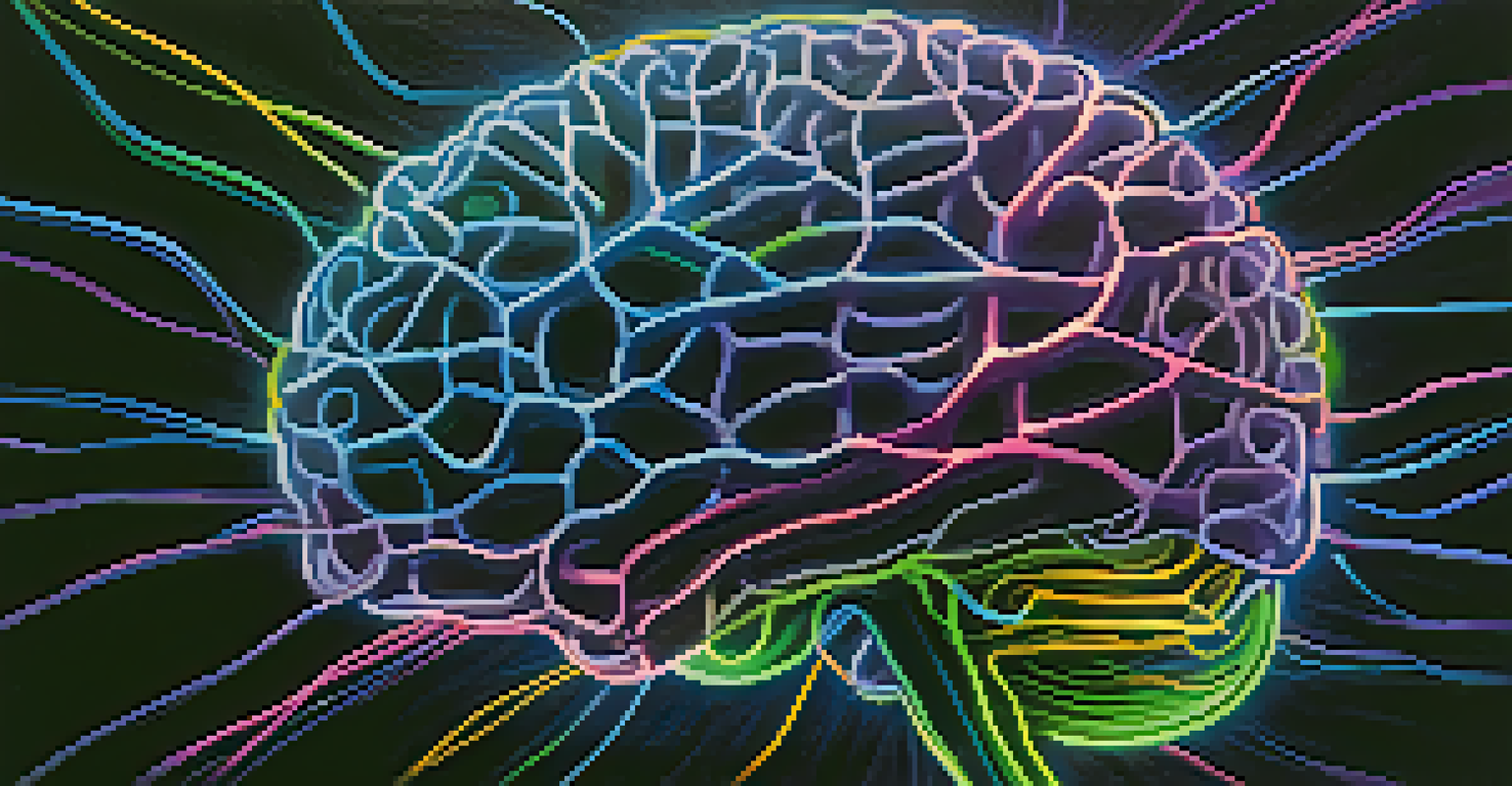Psychedelics in Medicine: Current Applications and Future Outlook

Introduction to Psychedelics in Modern Medicine
Psychedelics, often viewed with skepticism, are making a comeback in the field of medicine. Once relegated to the counterculture, substances like psilocybin and MDMA are now being researched for their therapeutic potential. This shift is not just about reevaluating the past; it's about understanding how these compounds can address some of today's most pressing mental health issues.
Psychedelics can help us confront the underlying issues that contribute to mental health disorders, offering a path to healing that transcends traditional methods.
Researchers are delving into how psychedelics can help with conditions such as depression, PTSD, and anxiety. These substances may offer new hope, particularly for those who have found little relief through conventional treatments. As studies progress, the dialogue around psychedelics is evolving from stigma to acceptance.
In this article, we'll explore the current applications of psychedelics in medicine and look ahead to what the future might hold. By examining ongoing research and real-world applications, we can better appreciate the role these substances could play in healthcare.
Psychedelics and Mental Health: A New Frontier
One of the most significant areas of research is the use of psychedelics for mental health disorders. For instance, studies have shown that psilocybin can lead to substantial improvements in patients with treatment-resistant depression. This groundbreaking work indicates that psychedelics might not just be a temporary fix, but rather a means to facilitate lasting change.

The therapeutic effects of psychedelics often stem from their ability to promote profound introspective experiences. Users frequently report shifts in perspective, which can help them confront and process deep-seated emotional issues. This capacity to foster connection and understanding within oneself can be incredibly powerful in a therapeutic setting.
Psychedelics Aid Mental Health Recovery
Research shows psychedelics like psilocybin and MDMA can significantly improve conditions such as depression and PTSD.
As more clinical trials emerge, the evidence supporting psychedelics as a viable treatment option continues to grow. Healthcare professionals are beginning to recognize the potential of these substances, integrating them into treatment plans to enhance patient outcomes.
Psychedelics in PTSD Treatment: Hope for Veterans
Post-traumatic stress disorder (PTSD) is a debilitating condition affecting many, particularly veterans. Recent studies suggest that MDMA-assisted therapy may offer a new avenue for healing. In controlled settings, patients have reported significant reductions in PTSD symptoms after undergoing treatment involving MDMA.
The potential for psychedelics in treating PTSD and other mental health issues is vast, but we must approach this with both caution and optimism.
The therapeutic approach typically combines the drug with psychotherapy, allowing patients to process traumatic memories in a safe environment. This combination can lead to breakthroughs that traditional therapies may not achieve. It's a promising model that highlights the importance of context in which psychedelics are used.
As the stigma around psychedelics wanes, there's growing support for their use in treating PTSD. Advocates argue that, with proper regulation and clinical oversight, these substances could transform the landscape of mental health treatment for those who have endured unimaginable trauma.
Psychedelics and Substance Use Disorder: A Path to Recovery
Substance use disorder (SUD) is another area where psychedelics are showing promise. Research indicates that substances like ayahuasca and psilocybin can aid in addiction recovery by helping individuals confront their underlying issues. This approach can lead to significant behavioral changes and a renewed sense of purpose.
The use of psychedelics in this context often encourages users to rethink their relationship with substances. Participants in studies frequently report a profound sense of clarity and a desire to choose healthier paths. By addressing the root causes of addiction, psychedelics may provide a holistic approach to recovery.
Promising Future for Psychedelic Therapy
Ongoing studies suggest that psychedelics may expand treatment options, leading to new therapeutic applications in mental health.
As we continue to learn more about the connection between psychedelics and addiction treatment, it's essential to approach this with caution. While early findings are promising, further research is necessary to establish safe and effective protocols.
Legal Considerations and Changing Regulations
The legal landscape surrounding psychedelics is rapidly evolving. As research highlights the therapeutic benefits of these substances, various states and countries are reconsidering their legal status. Some places have even begun to decriminalize certain psychedelics, paving the way for future therapeutic applications.
However, with these changes come challenges. Regulatory frameworks must be established to ensure patient safety while promoting research and clinical use. It's crucial to strike a balance between accessibility and responsible usage to prevent potential misuse.
As we move forward, advocacy and education will play significant roles in shaping public perception and policy regarding psychedelics. Engaging in open conversations about their potential benefits and risks can help ensure that these substances are used responsibly and ethically.
Challenges and Risks of Psychedelic Research
Despite the promising research, there are challenges and risks associated with the use of psychedelics in medicine. One major concern is the potential for adverse psychological reactions, especially in uncontrolled settings. Ensuring that individuals are properly screened and monitored is essential to mitigate these risks.
Additionally, the long-term effects of psychedelics are still not fully understood. While many users report positive outcomes, comprehensive studies are needed to assess both the benefits and potential drawbacks over time. This uncertainty underscores the need for rigorous scientific inquiry.
Legal Changes Boost Psychedelic Research
Evolving regulations are facilitating the investigation of psychedelics, highlighting the need for responsible use and safety measures.
Moreover, public perception can also be a barrier to the acceptance of psychedelics in mainstream medicine. Misconceptions about their use can lead to resistance from both healthcare providers and patients. Education and awareness campaigns will be vital in addressing these concerns and fostering a more informed dialogue.
The Future of Psychedelics in Medicine
Looking ahead, the future of psychedelics in medicine appears bright, with ongoing research paving the way for new applications. As more studies are conducted, we may uncover additional therapeutic uses for these substances, expanding their role in mental health care. There's a growing recognition that psychedelics could complement existing treatment modalities.
Furthermore, the integration of psychedelics into mainstream healthcare could lead to new training programs for therapists and medical professionals. This would ensure that they are well-equipped to guide patients through psychedelic-assisted therapies safely and effectively. Training will be crucial as we navigate this new frontier in mental health treatment.

Ultimately, the journey of psychedelics in medicine is just beginning. With continued research, education, and open-mindedness, we can unlock the full potential of these substances, offering new hope to those in need.